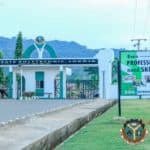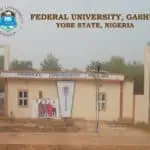President Tinubu Mandates Integration of NOUN Graduates into NYSC and Law School
Are you aware that President Bola Tinubu has made groundbreaking changes for National Open University (NOUN) graduates? How might this transform their futures? In a historic move, Tinubu directed their inclusion in the National Youth Service Corps and allowed Law graduates to enrol in the Nigerian Law School. But what does this mean for distance education in Nigeria?

The National Open University of Nigeria (NOUN), a pivotal institution in Nigeria’s educational framework, has recently seen significant policy advancements under President Bola Tinubu’s administration. In a groundbreaking move, President Tinubu has directed the Ministry of Education to integrate NOUN graduates into the National Youth Service Corps (NYSC) scheme and permit the university’s law graduates to attend Law School, thus promoting equal opportunities for all.
| Directive | Tinubu directs NYSC, Law School inclusion for NOUN grads. |
| Announcement | Directive given at NOUN’s 13th convocation, Abuja. |
| Background | Previous NYSC, Law School exclusion due to part-time status. |
| Legal Context | 2015 lawsuit by Law grads for inclusion, later rejected. |
| Government’s Role | Recognised need for inclusivity in education reforms. |
| Education Enhancement | Aims to improve quality, access, affordability. |
| ODL Importance | Stresses role in achieving Sustainable Development Goals. |
| ICT Utilisation | Enhancements to support education via technology. |
During his address at the 13th convocation ceremony held at the Convocation Arena in Jabi, Abuja, President Tinubu, represented by Deputy Executive Secretary Biodun Saliu of the National Universities Commission (NUC), outlined this directive. This decision marks a significant shift from previous policies and addresses long-standing barriers faced by NOUN graduates, particularly those from the Law Department.
Historically, NOUN students have faced challenges in gaining access to these critical national services. The institution, established to offer courses primarily by correspondence under the original Act, was categorized under part-time studies, which are typically excluded from the NYSC according to National University Commission law. This exclusion was also upheld by a Federal High Court ruling in Port Harcourt, which dismissed a lawsuit from NOUN Law graduates seeking admission into the Nigerian Law School.
However, the new directive not only opens the doors of opportunity for these graduates but also aligns with the changing demographics and needs of the nation. President Tinubu emphasized the government’s recognition of the importance of inclusive education policies that cater to all citizens regardless of their mode of study. The adjustments are intended to improve the quality, access, and affordability of education in Nigeria.
Furthermore, President Tinubu expressed his satisfaction with the progress NOUN has made over the years. He highlighted the crucial role that Open and Distance Learning (ODL) plays in the nation’s educational system, especially in achieving the 2030 Sustainable Development Goals. The President’s administration is committed to enhancing ODL to broaden access to higher education across Nigeria, leveraging Information and Communication Technology (ICT) to advance educational goals.
This policy revision is not merely administrative but a celebration of the academic achievements of NOUN graduates and a testament to the evolving landscape of education in Nigeria. The government, through the Federal Ministry of Education and the NUC, is dedicated to providing the necessary support to ensure the successful implementation of this new educational model.
By enabling NOUN graduates to participate in the NYSC and attend Law School, the government is ensuring that all graduates, regardless of their educational pathway, have equal opportunities to contribute to national development. This initiative is expected to address any remaining concerns or uncertainties and promote a more inclusive educational environment in Nigeria.
Share This Post: If this post helped you, share it with others! Use the buttons below to spread the word!
More Articles:
- National Open University of Nigeria (NOUN) 2026_1 Online Facilitation Guide: Dates, LMS Login Link, New Student Steps and Support Email
- National Open University of Nigeria (NOUN) Approved 2026 Academic Calendar: Registration, Exams, Matriculation, Convocation, Results
- National Open University of Nigeria (NOUN) Schedules University-Wide Zoom Briefing on TISHIP for 10 January 2026
- National Open University of Nigeria (NOUN) 2025_2 virtual e-examination postponed to Monday 8 December 2025
- University of Lagos (UNILAG) Course Registration Portal Reopens for First Semester 2025/2026 (18-22 Feb 2026)
- Kogi State Polytechnic Second Semester Resumption Date 2025/2026 and Start of Academic Activities
- Abubakar Tafawa Balewa University (ATBU) Extends First Semester Registration 2025/2026: New Deadline and Dates (18 Feb to 4 Mar)
- Federal University Gashua (FUGASHUA) Portal Reopening 2025/2026: Registration Dates, Deadline, N10,000 Late Fee





